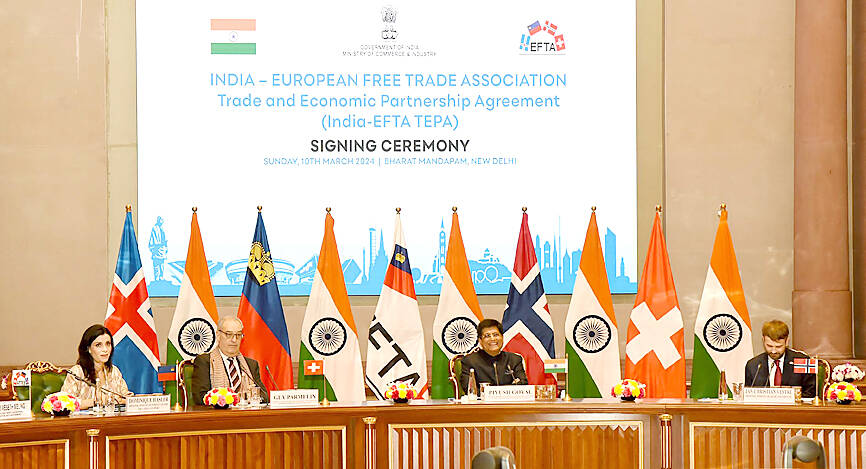India on Sunday signed a trade agreement with Iceland, Liechtenstein, Norway and Switzerland that includes a commitment of US$100 billion in investments and creating 1 million direct jobs in the South Asian nation in the next 15 years.
New Delhi committed to reducing import tariffs on industrial products from the four European countries that comprise the European Free Trade Association (EFTA).
“The landmark agreement between India and EFTA is set to bring significant economic benefits, such as better integrated and more resilient supply chains, new opportunities for businesses and individuals on both sides leading to increased trade and investment flows, job creation, and economic growth,” an EFTA communique said.

Photo: AFP / Indian Press Information Bureau
Indian Minister of Commerce and Industry Piyush Goyal said India for the first time had signed an agreement with an important economic bloc in Europe.
The country is also working on trade pacts with the UK and the EU, he said.
The trade pact with the EFTA includes trade in goods and services, investment promotion and cooperation, intellectual property, government procurement, trade and sustainable development and dispute settlement.
It would provide a window for Indian exporters to access European and global markets, Goyal said in a statement.
The agreement was signed in New Delhi by Goyal, Swiss Department of Economic Affairs head Guy Parmelin, Iceland Minister of Foreign Affairs Bjarni Benediktsson, Liechtenstein Minister of Foreign Affairs Dominique Hasler and Norwegian Minister of Trade and Industry Jan Christian Vestre.
Parmelin, speaking on behalf of the EFTA member states, said: “EFTA countries gain market access to a major growth market. Our companies strive to diversify their supply chains while rendering them more resilient. India, in return, will attract more foreign investment from EFTA, which will ultimately translate into an increase in good jobs.”

NEW IDENTITY: Known for its software, India has expanded into hardware, with its semiconductor industry growing from US$38bn in 2023 to US$45bn to US$50bn India on Saturday inaugurated its first semiconductor assembly and test facility, a milestone in the government’s push to reduce dependence on foreign chipmakers and stake a claim in a sector dominated by China. Indian Prime Minister Narendra Modi opened US firm Micron Technology Inc’s semiconductor assembly, test and packaging unit in his home state of Gujarat, hailing the “dawn of a new era” for India’s technology ambitions. “When young Indians look back in the future, they will see this decade as the turning point in our tech future,” Modi told the event, which was broadcast on his YouTube channel. The plant would convert

‘SEISMIC SHIFT’: The researcher forecast there would be about 1.1 billion mobile shipments this year, down from 1.26 billion the prior year and erasing years of gains The global smartphone market is expected to contract 12.9 percent this year due to the unprecedented memorychip shortage, marking “a crisis like no other,” researcher International Data Corp (IDC) said. The new forecast, a dramatic revision down from earlier estimates, gives the latest accounting of the ongoing memory crunch that is affecting every corner of the electronics industry. The demand for advanced memory to power artificial intelligence (AI) tasks has drained global supply until well into next year and jeopardizes the business model of many smartphone makers. IDC forecast about 1.1 billion mobile shipments this year, down from 1.26 billion the prior

People stand in a Pokemon store in Tokyo on Thursday. One of the world highest-grossing franchises is celebrated its 30th anniversary yesterday.

Zimbabwe’s ban on raw lithium exports is forcing Chinese miners to rethink their strategy, speeding up plans to process the metal locally instead of shipping it to China’s vast rechargeable battery industry. The country is Africa’s largest lithium producer and has one of the world’s largest reserves, according to the US Geological Survey (USGS). Zimbabwe already banned the export of lithium ore in 2022 and last year announced it would halt exports of lithium concentrates from January next year. However, on Wednesday it imposed the ban with immediate effect, leaving unclear what the lithium mining sector would do in the